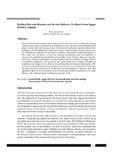| dc.contributor.author | Obicci, Peter Adoko | |
| dc.date.accessioned | 2018-12-17T13:38:41Z | |
| dc.date.available | 2018-12-17T13:38:41Z | |
| dc.date.issued | 2014-09 | |
| dc.identifier.issn | 2078 - 7 049 | |
| dc.identifier.uri | http://hdl.handle.net/20.500.12305/352 | |
| dc.description.abstract | Does political decentralization improve the provision of service delivery? Many developing countries have taken to political decentralization as an instrument of development that plays a central role in increasing citizens’ involvement in policy development and decision making as well as holding their leaders to account. However, the basis upon which it can be relied upon to improve service delivery remains a big puzzle to many practitioners. This study uses the factors of decision making, participation and accountability to uncover how political decentralization can promote service delivery. Based on intensive interviews with local stakeholders in ten sampled local governments in Agago District in Northern Uganda as well as survey, the study uncovered a complex interplay of conditions that impact service delivery in a political decentralization dispensation. The results reveal that political decentralization can be used as an instrument to promote the provision of service delivery. Furthermore, decentralization is shown to have had significant effect on service delivery in the ten local governments examined in the study. However, the study needs generalization on a larger scale. | en_US |
| dc.language.iso | en | en_US |
| dc.publisher | Uganda Management Institute | en_US |
| dc.subject | Accountability | en_US |
| dc.subject | Agago District | en_US |
| dc.subject | Decentralization | en_US |
| dc.subject | Decision making | en_US |
| dc.subject | Political decentralization | en_US |
| dc.subject | Uganda | en_US |
| dc.title | Political decentralization and service delivery: Evidence from Agago District, Uganda | en_US |
| dc.type | Article | en_US |

